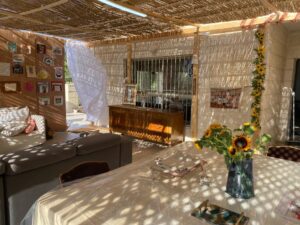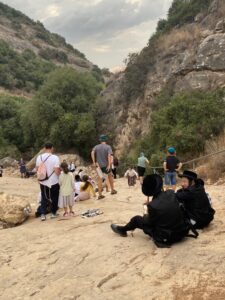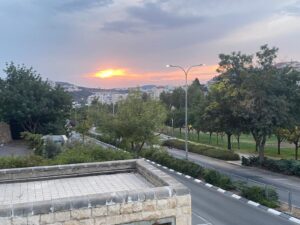This Land is Our Land
Our First Few Weeks After Aliyah – in the Midst of a War
Esty Dershowitz
Editor’s note: We were honored to feature Esty’s story shortly before she and her family made Aliyah. While we had planned to share a follow up, no one dreamed that it would take place during a war that broke out five weeks after their arrival. A little over a week after the brutal Simchas Torah attacks, Esty and I were on the phone discussing the situation when she had to cut the call short and run for shelter as the air raid siren shrilled in the background. When we resumed our conversation, her daughter walked in from her first outing since Simchas Torah: a brachos party at the home of a classmate that continued within the walls of the maamad (shelter) they’d fled to a few minutes after all the girls arrived.
There is so much I can write here about the emunah that rises from the words of Esty’s story. Instead, I’ll share the addendum she sent me to clarify something in the article you’re about to read: “My husband was supposed to start Kollel this week, and I was scared to let him go. The kids aren’t in school, and I was worried that if something happened, chas v’ shalom, we’d be alone. I called Rabbi Rokeach to ask what to do, and I think that his message is one that everyone should hear. He told me that my husband should go to kollel, and his learning will be a shmirah for our family. So yesterday, my husband started kollel.”
May that learning indeed be a zechus for the Dershowitz family, may our collective tefillos and learning serve as a zechus for all of Klal Yisrael, and may we merit the swift return of peaceful days to the land we hold so dear.
Our journey here was miraculous, starting with the way we found our apartment. Everyone told us that what we were looking for was impossible to find, and it seemed that way. But we ended up with exactly what we were looking for, and it felt like Hashem sent it straight to us.
It was surreal waking up that first morning and realizing that we were here in this land. It still feels that way.
Rosh Hashanah here was unlike any I’ve experienced. Most of the men were in Uman, warriors fighting a spiritual war. Davening started at sunrise, and between the early hour and the lack of men, it wasn’t what I expected. So, for inspiration, I spent time just looking out at the mountains of Eretz Yisrael and focusing on where I live. But Yom Kippur was amazing; all the men were back. They do this thing where everyone starts clapping when they say “Hamelech HaKadosh.” It’s like they can’t contain their excitement that Hashem is our King! A few years ago, I started wearing a scarf on Yom Kippur to help me elevate my tefillah, and I got used to being the only one in shul doing that. Over here, I fit right in.
Sukkos was as beautiful as you can imagine. I’m sorry to share this with all you Americans, but we didn’t go to a single simchas bais hashoeva. We spent Chol Hamoed taking our kids on trips so they could become acquainted with the beauty and magic of Eretz Yisrael. I wanted them to have fun and not have to rush back or stay up until one in the morning because we went to Yerushalayim at night. That’s something we can do next year when we are more settled!
We went jeeping in the Gush, and in the middle of our hair-raising ride, our guide stopped to show us a mikvah from the times of the Beis Hamikdash that people used while they were being oleh regel. Next to it was a wine press that they used for karbanos. I had this incredible moment of connection, at the magnitude of our connection to this place, and the knowledge that this is our past, present, and future. The Jews being oleh could have been me, and one day soon, b’ezras Hashem, it will be.
Every place we visited was so drenched in history, I felt like I was showing my kids: this is who we are.
Simchas Torah was insane.
I live in an open area, and sometimes when the wind blows you can hear it whistling. So that morning, I heard whistling very early on, while my kids were still asleep, and I figured it was the wind. Then I thought it was an ambulance. And then I went out onto my porch and recognized it for what it was: an air raid siren.
I knew right away that we were under attack. You don’t hear those sirens unless that’s what’s happening. I lived in Israel during the Gulf War, and I knew that with certainty.
I started screaming: “Everyone, get into the shelter now!” My kids were still sleeping, and I kept trying to wake them up until finally they realized what I was saying. They all ran to the bomb shelter, which is actually my daughter’s room. My husband was in shul, and in my panic, I decided I had to close the trissim (shutters) downstairs. So, I ran down, and that’s how my husband found me when he walked in, in a frenzy trying to close the shutters manually because it was Yom Tov. He took one look at me and said, “Get into the bomb shelter now!”

There were four sirens within two hours. I was talking to a friend afterwards, and she said that the last time we were under attack, there were maybe four sirens in two months. And so, this time, everybody knew that this was big, that something was happening.
After that fourth siren, when it had quieted down for a bit, I decided the best thing was to get my kids dressed and go to shul. We left our apartment, and I saw that everyone was walking around calmly, like nothing was going on, like there hadn’t just been four sirens.
I said to my daughter, “Look at that group of girls at the bottom of the steps. They’re your age. Look how calm they are. They left their houses because they know they’re safe.” I gestured at the other people around us. “Every single person that is walking up and down the street is radiating emunah. Nobody is leaving the house unless they have full emunah that they’re safe.” Can you imagine what a lesson that was for us?

We got to shul and started hearing reports of missiles being fired and boys being called up to the army. We were trying to put together bits and pieces of what was going on. We still had no idea what was happening. Our Rav gathered everyone and spoke about how when there’s a levayah everyone walks past the meis in a straight line. But on Simchas Torah, we stand in a circle so we can face each other, feeding off each other’s energy, because Hashem wants us to connect and become one. When we’re dancing with the sefer Torah, and we’re all in a circle, we become connected with each other and with the Torah.

This shul is extremely diverse. There are guys who dress all in white, who wear hamburgs and cowboy hats, knitted yarmulkes and long peyos. There are no words to describe what it was like watching them dance. As the siren went off, they continued to dance and sing: Am Yisrael Chai! They were living the message that our nation is forever, and we are going to live no matter what anyone tries to do to us. I was so drawn in and mesmerized by that dancing because of the feeling in that room. It was so powerful.
We didn’t hear another siren for a few days. What we did hear for four days straight were the army planes flying overhead, the Iron Dome interceptions, and the sound of explosions. The ground shook beneath our feet. This went on nonstop, all through the night. I felt like I was getting undone. I wasn’t functioning as a person. I didn’t eat. I was walking around shaking. But I put on a brave face. As a mother, you have to put on a strong face because you don’t want to scare the kids. Every move you make is measured because of the sirens. Every sound makes you jump. You can’t leave your house because what if the siren goes off? And even if you do manage to venture out to the closest store, the shelves are half empty.
And all through this, the kids are home, and you need to keep them sane. In the beginning, I wasn’t sure how to explain the situation to them, so I sought advice from the daughter of a Rav we trust and from a relative who gives parenting classes. I told my daughter that bad people did something very bad to the Jews, but we are safe where we are. I explained that the sirens are a precaution, a signal that we need to protect ourselves, the same way we look both ways when we cross a street. I didn’t use the word war, and I told her to always come to me with any questions. I also reassured her that Hashem sent us a very strong army to protect us, but we can create even more protection by doing mitzvos to create malachim to watch over us.
Ten minutes after this conversation, my daughter returned to me and asked if this is normal for the girls in her class, if this is just the way they live. I told her that no, it’s not normal, it is scary, but they just have more experience with it. We were here for all of five weeks, and she had no idea if this was just everyday life in Eretz Yisrael.
My son is too young to understand much of what’s going on. He saw me bake muffins for the chayalim at the beginning of the week, and he said, “When I get older, I’m going to be a soldier to protect the Beis Hamikdash! And then I’m going to get muffins!” I posted that on my social media and wrote thank you to the terrorists for making my son into a chayal after just a few weeks of living here.
Lighting candles this past Shabbos was triggering, because Simchas Torah was last Shabbos. I’ve been lighting ten minutes early for years, but this week there was a whole movement of people lighting early. As the zman got closer, I did whatever I could to encourage others to join. I called my tenant in America and said, “Please do me a favor. When you light candles, remind Hashem of all the hours and weeks and months I spent in that room davening for my family.”
I called Rebbetzin Sari Rokeach with a she’eilah for Rabbi Rokeach (Rav of Marine Park’s Bais Mordechai D’Bertch) (editor’s note: see introduction) and during our conversation I told her that I was barely managing with the noise of the planes and explosives all day and night and couldn’t tolerate also watching it on the news or seeing pictures. At the same time, I felt that by avoiding the footage, I was not being sympathetic to the pain of others. The Rebbetzin told me, “No, you’re not supposed to look. It’s not going to help you fight the war. It’s not going to make you daven better. We know what we need to daven for, and we know what we need to be doing. You need to be able to function. You’re living in a war zone and that’s enough.” She also mentioned that her sons are still in Eretz Yisrael. Everything she said was a huge relief to me.
On Shabbos afternoon, I felt like a switch went off inside me. I was reading, “Avraham yagel, Yitzchak yiranen,” (Yeshayah 65:19; literal translation: “Avraham will rejoice; Yitzchak will sing.”) and I suddenly felt my fear dissipating. I thought, Mashiach is going to come, and I am going to experience it. I won’t be scared of airplanes anymore because one day I’ll be so excited to hear that sound; it will be the sound of airplanes carrying Jews back to Eretz Yisrael. I just want to hold onto that feeling.
On Friday, I heard music. There in the street was a parade of about 30 cars with teenagers hanging out the windows, waving Israeli flags and singing at the top of their lungs. And I started crying. An hour later there was a truck going around playing music. And on the ram-kol that rings every week right before Shabbos, they played music for the first time. That’s the Israeli spirit.
I hope and believe that I’ll come out of this stronger. What happened here is terrible. It’s scary. But I’m still looking up to the One Above, and there’s nowhere else I’d rather be.
You must be logged in to post a comment.